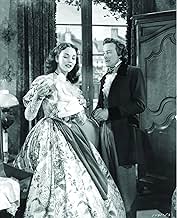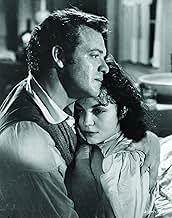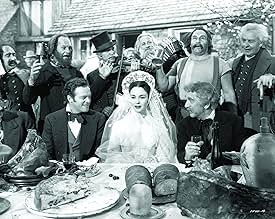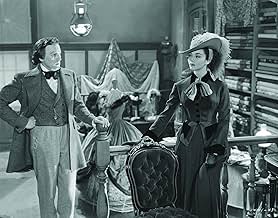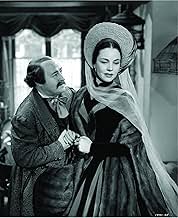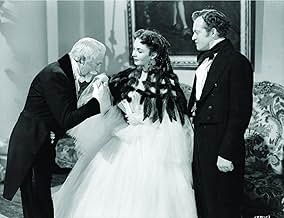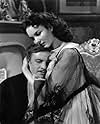NOTE IMDb
7,0/10
3,2 k
MA NOTE
Les illusions romantiques de la femme d'un médecin de province sur la vie et le statut social la conduisent à trahir son mari naïf, à se faire des amants et à accumuler des dettes ruineuses.Les illusions romantiques de la femme d'un médecin de province sur la vie et le statut social la conduisent à trahir son mari naïf, à se faire des amants et à accumuler des dettes ruineuses.Les illusions romantiques de la femme d'un médecin de province sur la vie et le statut social la conduisent à trahir son mari naïf, à se faire des amants et à accumuler des dettes ruineuses.
- Réalisation
- Scénario
- Casting principal
- Nommé pour 1 Oscar
- 2 victoires et 1 nomination au total
Alf Kjellin
- Leon Dupuis
- (as Christopher Kent)
Harry Morgan
- Hyppolite
- (as Henry Morgan)
Avis à la une
Films of great novels are usually light years away in terms of quality from their originals. There are of course a few exceptions, the David Lean Dickens adaptations for instance and recently a Neil Jordan version of Graham Greene's "The End of the Affair" that I much admired. Generally it is second rate literature, "Gone WIth the Wind" a prime example, that fares so much better. Flaubert's "Madame Bovary" has continued through the history and development of cinema and TV to exert its fascination on would-be translators, although it has to be admitted that it has generally proved elusive. One would have thought that it would have fared particularly well in the hands of outstanding French directors such as Renoir and Chabrol but their efforts to come to grips with Flaubert's masterpiece have ultimately to be judged as among their lesser works. There is quite a lot going for Jean Renoir's early 1933 version, not least the authentic Normandy exteriors shot with great affection, but technically the film shows its age. It is rather like a series of tableaux, some in themselves quite well done, but ultimately lacking a strong narrative thrust and sense of cohesion. Nevertheless I remember being more impressed with it than with Claude Chabrol's 1991 version which I found surprisingly cold and passionless. I admit I have only seen this once and my memory of it is far from clear, perhaps because it grabbed me so little at the time. It may seem rather preposterous to award the accolade for the best "Bovary" to Vincente Minnelli's Americanised 1949 MGM version with its studio mock-up of a French village that seems more of a Flanders lookalike and some location work clearly done in Californian woodland, but, in the absence of so little competition, I would have to plump for it as being certainly the most enjoyable. After all it has that quite exquisite beauty, Jennifer Jones, as the eponymous heroine, suffering and eventually dying as tenderly as only she can. My favourite memory from the film is her first appearance on the farm where Doctor Bovary is calling to tend to her sick father. There she is in a setting of all too believable rural squalor decked out in the most unbelievably opulent dress imaginable. If nothing else it makes Bovary's initial besottedness with her absolutely credible. Minnelli's is a rather sanitised adaptation. Okay to have the heroine die beautifully once the initial agony of taking poison has been established, but the inevitable outcome of a botched operation on a villager's clubfoot - amputation - is, unlike in the novel and other versions, evaded by the doctor's refusal to take on the medical challenge. It makes for rather more comfortable box-office. There are some beautifully done scenes including the almost obligatory inclusion in a Hollywood period piece of a ballroom sequence. The one here has the hedonistic movement that is everything we had come to expect from "The Great Waltz" onwards. There is also the heroine's wait, her bags fully packed in a windswept street after dark for the lover that never comes. Wyler did it rather better in "The Heiress" but Minnelli's has plenty of atmosphere. His version may be even further than its competitors from Flaubert's "Madame Bovary" but he invests it with enough passion and commitment to ensure it a small place in Hollywood history.
Though I'm sure that the various French dramatizations of Madame Bovary are probably superior to this film, this English language version that MGM did in 1949 is as good as any we would have gotten from Hollywood. of that era. Jennifer Jones, Van Heflin, Louis Jourdan, and James Mason were unfortunately hampered by the Code in this version.
MGM's version incorporates the author right into his story. James Mason plays Gustave Flaubert and the film opens with him on trial for authoring indecent material as the French censors of the day saw Madame Bovary. While on the witness stand defending his work, he tells the story of his creation Emma Bovary, a girl with silly romantic notions who brings tragedy all around because of them.
Jennifer Jones is Emma and imagine Bernadette Soubirous who instead of having a divine experience has the misfortune to have other things peak her interest as an adolescent. She reads a whole lot of romantic novels who give her exaggerated notions about the nature of love.
She lives in a pretty dull town in Normandy which was also where Flaubert himself hailed from and which he satirizes in acid in this work. She marries solid, dependable Van Heflin who's a doctor and who she hopes will give her a better life.
It's in Heflin's character that the Code watered down what Flaubert was trying to say. Here he's an upright guy, a lot on the dull side, but dependable. In the novel he's as much desiring of social climbing as Jones is. In fact in the film he refuses to perform an operation that might gain him fame and success because he knows he's not qualified to do it. In the novel he does the operation and it ends in disaster all around.
Jones takes lovers Louis Jourdan and Alf Kjellin and runs up bills that put Heflin into financial disaster. All the while refusing to face the truth about life and herself.
Given the Code restrictions director Vincente Minnelli does as best as he can with his cast. James Mason makes a brilliant and erudite Flaubert on the stand. But considering he was on trial for indecency by not showing the alleged indecency to the fullest the Code defeated what could have been a classic.
MGM's version incorporates the author right into his story. James Mason plays Gustave Flaubert and the film opens with him on trial for authoring indecent material as the French censors of the day saw Madame Bovary. While on the witness stand defending his work, he tells the story of his creation Emma Bovary, a girl with silly romantic notions who brings tragedy all around because of them.
Jennifer Jones is Emma and imagine Bernadette Soubirous who instead of having a divine experience has the misfortune to have other things peak her interest as an adolescent. She reads a whole lot of romantic novels who give her exaggerated notions about the nature of love.
She lives in a pretty dull town in Normandy which was also where Flaubert himself hailed from and which he satirizes in acid in this work. She marries solid, dependable Van Heflin who's a doctor and who she hopes will give her a better life.
It's in Heflin's character that the Code watered down what Flaubert was trying to say. Here he's an upright guy, a lot on the dull side, but dependable. In the novel he's as much desiring of social climbing as Jones is. In fact in the film he refuses to perform an operation that might gain him fame and success because he knows he's not qualified to do it. In the novel he does the operation and it ends in disaster all around.
Jones takes lovers Louis Jourdan and Alf Kjellin and runs up bills that put Heflin into financial disaster. All the while refusing to face the truth about life and herself.
Given the Code restrictions director Vincente Minnelli does as best as he can with his cast. James Mason makes a brilliant and erudite Flaubert on the stand. But considering he was on trial for indecency by not showing the alleged indecency to the fullest the Code defeated what could have been a classic.
Madame Bovary is directed by Vincente Minnelli and adapted to screenplay by Robert Ardrey from the Gustave Flaubert novel. It stars Jennifer Jones, Van Heflin, Louis Jourdan, Alf Kjellin, Gene Lockhart and James Mason. Music is by Miklós Rózsa and cinematography by Robert H. Planck.
It's most interesting now watching Minnelli's picture and being able to place it in the time it was made. Also of major interest is reading up on what the critics of the time had to say about it. This version is an undoubted lesson in the technical crafts of film making, the visuals, the sound, art design, costuming and a literary pumped screenplay that allows the cast to play it classical. It's also black hearted, perfectly in keeping with the gathering storm of the era that was film noir.
Here is the monster.
Some of the complaints about the film, to me anyway, just don't add up. Why do we need to care about anyone in this story? It's a dark tale of illicit passions, greed, betrayals, bad parenting and etc. Is this frowned upon in some circles because of love for the classic novel? Or because there's some esteem held for other versions? The criticism of Jones is also very suspect given it's a classic femme fatale performance, Emma is cold and driven and shallow to others feelings, Jones works it perfectly.
As Rózsa's beautiful lush and poignant musical arrangements drift and hover over the various story instalments, Minnelli brings the film making guile. His camera work is sublime, like a ghost moving about the characters for the more vibrant scenes, tracking and roving, dizzyingly beautiful. At others it's close and personal, imbuing Emma's claustrophobia, with the black and white contrasts superbly photographed by Planck.
So it doesn't capture the essence of Flaubert's intent, then? Emma Bovary a figure of hate instead of sympathy, the lack of a caustic aside on a society of double standards? So what! Outstanding film making is just that, especially when it can tune into a style of film making prevalent at its birth. Madame Bovary - maybe the most film noir movie not actually considered a film noir. Brilliant. 9/10
It's most interesting now watching Minnelli's picture and being able to place it in the time it was made. Also of major interest is reading up on what the critics of the time had to say about it. This version is an undoubted lesson in the technical crafts of film making, the visuals, the sound, art design, costuming and a literary pumped screenplay that allows the cast to play it classical. It's also black hearted, perfectly in keeping with the gathering storm of the era that was film noir.
Here is the monster.
Some of the complaints about the film, to me anyway, just don't add up. Why do we need to care about anyone in this story? It's a dark tale of illicit passions, greed, betrayals, bad parenting and etc. Is this frowned upon in some circles because of love for the classic novel? Or because there's some esteem held for other versions? The criticism of Jones is also very suspect given it's a classic femme fatale performance, Emma is cold and driven and shallow to others feelings, Jones works it perfectly.
As Rózsa's beautiful lush and poignant musical arrangements drift and hover over the various story instalments, Minnelli brings the film making guile. His camera work is sublime, like a ghost moving about the characters for the more vibrant scenes, tracking and roving, dizzyingly beautiful. At others it's close and personal, imbuing Emma's claustrophobia, with the black and white contrasts superbly photographed by Planck.
So it doesn't capture the essence of Flaubert's intent, then? Emma Bovary a figure of hate instead of sympathy, the lack of a caustic aside on a society of double standards? So what! Outstanding film making is just that, especially when it can tune into a style of film making prevalent at its birth. Madame Bovary - maybe the most film noir movie not actually considered a film noir. Brilliant. 9/10
Film opens at Flaubert's (Mason) 1857 trial for obscenity in France. After the prosecution finishes its' case, Flaubert answers; his answer frames a flashback to Emma Bovary's (Jones) story.
She grows up on an isolated farm, and is further isolated by her convent education. She grows up believing and fantasizing about love and romance, and that they happen in real life as in fiction. When Dr. Bovary (Heflin) comes to treat her fathers' broken leg, she sees him as her Prince Charming and falls in love with him. After the two marry, they go to the village in Normandy where Charles lives. .
Jones is extraordinary as Madame Bovary. She hits all the right notes as a girl who can't/doesn't separate fantasy from reality. She is marvelously subtle as a woman who switches from role to role in her fantasy life, and doesn't let reality intrude until it's too late. She at least deserved a Best Actress nomination from the Academy.
Van Heflin is good if overemphatic and too American as Emma's husband. Louis Jourdan is just about perfect as Emma's seducer who literally sweeps her off her feet. James Mason is fine as Flaubert.
Miklos Rozsa contributed a fine score, with especially notable music for the ball scene. Vincent Minnelli's direction is subtle. This is a very good film for a tearjerker. Jones and Minnelli are at their best.
She grows up on an isolated farm, and is further isolated by her convent education. She grows up believing and fantasizing about love and romance, and that they happen in real life as in fiction. When Dr. Bovary (Heflin) comes to treat her fathers' broken leg, she sees him as her Prince Charming and falls in love with him. After the two marry, they go to the village in Normandy where Charles lives. .
Jones is extraordinary as Madame Bovary. She hits all the right notes as a girl who can't/doesn't separate fantasy from reality. She is marvelously subtle as a woman who switches from role to role in her fantasy life, and doesn't let reality intrude until it's too late. She at least deserved a Best Actress nomination from the Academy.
Van Heflin is good if overemphatic and too American as Emma's husband. Louis Jourdan is just about perfect as Emma's seducer who literally sweeps her off her feet. James Mason is fine as Flaubert.
Miklos Rozsa contributed a fine score, with especially notable music for the ball scene. Vincent Minnelli's direction is subtle. This is a very good film for a tearjerker. Jones and Minnelli are at their best.
Three versions stand out as far as Flaubert's classic is concerned:the Jean Renoir one,with Valentine Tessier,which has not worn well,the acting has become unconvincing and almost lurid when you see it today,Minelli's version and Claude Chabrol's starring Isabelle Huppert ,which doesn't avoid totally academism,despite Jean-François Balmer's portrayal of Charles that steals the show . Now for Minelli 's attempt:some have been hard on his rendition,and however,it features the best Emma ever:Jennifer Jones,the romantic heroine par excellence.Her savage beauty,looking tense,triumphs here. The supporting acts are well-chosen:Van Heflin is oafish,meek.The French Louis Jourdan is well-cast as Rodolphe Boulanger,Emma's lover who betrays her and leaves her to despair.Their final confrontation,in Boulanger's luxury mansion oozes hatred and contempt. The main drawback is the rural background:Minelli did not realize how this country life disgusted Emma:the wedding,a very very peasant one ,which Flaubert describes in lavish detail,is too short on the screen.The farms are too clean-Emma dreamed her childhood away because she could not stand the mediocrity of her milieu.She jumped out of the frying pan into the fire:a two-bit doctor,a would-be sawbones who 's totally incompetent.Van Heflin's rendering makes up for Minelli's weaknesses.The movie is sandwiched between two brief scenes of Flaubert 's trial (He was accused of immorality in his book),that's redundant.It would have been better to tell the audience about Emma's daughter's terrible fate:after the doctor's death,an orphan,she becomes a worker in a spinning mill.Supreme decay for a mother who was longing to be a socialite.
Le saviez-vous
- AnecdotesAfter the expensive box-office failure of Le pirate (1948), director Vincente Minnelli worked hard to cut corners on this film, fearing he might be accused of extravagance. However, he devoted a great deal of time to the ball sequence, which he regarded as the most important scene in the film; he even had composer Miklós Rózsa compose the waltz theme used in it well in advance of the start of filming.
- GaffesWhen Madame Bovary asks Leon for money, he reacts by punching out one of the glass window panes. But on the next cut, the previously shattered window pane is now intact.
- Citations
Emma Bovary: Do you know, Charles, why that clock strikes? To announce the death of another hour.
- Versions alternativesAlso shown in a computer colorized version.
- ConnexionsFeatured in Some of the Best: Twenty-Five Years of Motion Picture Leadership (1949)
Meilleurs choix
Connectez-vous pour évaluer et suivre la liste de favoris afin de recevoir des recommandations personnalisées
Everything New on HBO Max in August
Everything New on HBO Max in August
Looking for something different to add to your Watchlist? Take a peek at what movies and TV shows are coming to HBO Max this month.
- How long is Madame Bovary?Alimenté par Alexa
Détails
- Date de sortie
- Pays d’origine
- Site officiel
- Langue
- Aussi connu sous le nom de
- Madame Bovary und ihre Liebhaber
- Lieux de tournage
- Société de production
- Voir plus de crédits d'entreprise sur IMDbPro
- Durée
- 1h 54min(114 min)
- Couleur
- Rapport de forme
- 1.37 : 1
Contribuer à cette page
Suggérer une modification ou ajouter du contenu manquant


